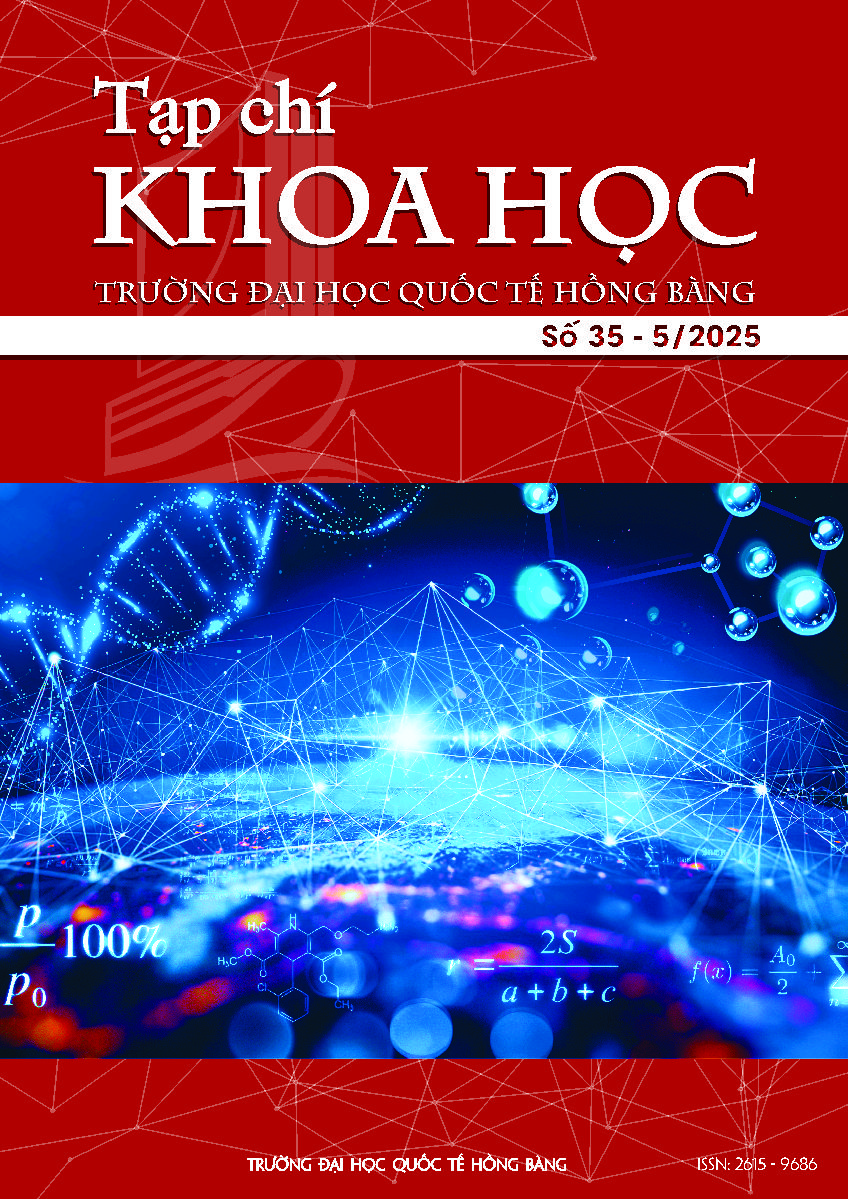Tác động của mạng xã hội đối với kỹ năng viết của sinh viên không chuyên tiếng Anh tại Trường Đại học Quốc tế Hồng Bàng
Các tác giả
DOI: https://doi.org/10.59294/HIUJS2025016Từ khóa:
học tập dựa trên mạng xã hội, Facebook, sinh viên không chuyên tiếng Anh, kỹ năng viếtTóm tắt
Việc sử dụng mạng xã hội ngày càng phổ biến đã ảnh hưởng đến nhiều lĩnh vực, đặc biệt là giáo dục. Nghiên cứu này tìm hiểu tác động của Facebook đến kỹ năng viết tiếng Anh của sinh viên không chuyên tại Trường Đại học Quốc tế Hồng Bàng. Phương pháp nghiên cứu hỗn hợp được áp dụng, bao gồm thực nghiệm tiền kiểm - hậu kiểm và thảo luận nhóm. Cuộc thực nghiệm đo lường sự thay đổi kỹ năng viết trước và sau khi thực hành viết trên Facebook. Kết quả cho thấy sinh viên có thái độ tích cực khi sử dụng Facebook như một công cụ học tập nhờ tính linh hoạt và khả năng tiếp cận. Về kỹ năng, người học cải thiện rõ ở nội dung, tổ chức và từ vựng. Tuy nhiên, ngữ pháp và phong cách viết học thuật vẫn còn hạn chế. Điều này cho thấy mạng xã hội có thể hỗ trợ phát triển kỹ năng viết, nhưng cần định hướng và hướng dẫn phù hợp để đạt hiệu quả cao trong học thuật. Nghiên cứu khuyến nghị mở rộng đối tượng, đánh giá tác động lâu dài và thử nghiệm thêm các mạng xã hội khác để hỗ trợ học tiếng Anh hiệu quả hơn.
Abstract
The increasing use of social media has significantly influenced various sectors, particularly education. This study investigates the impact of Facebook on the English writing skills of non-English major students at Hong Bang International University. A mixed-methods approach was employed, incorporating a pre-test–post-test experiment, and focus group discussions. The experiment measured changes in writing performance before and after participating in writing tasks on Facebook. The findings indicate that students responded positively to the integration of Facebook as a learning tool, primarily due to its accessibility and user-friendly nature. In terms of writing performance, participants demonstrated noticeable improvement in content development, organization, and vocabulary usage. However, there was limited progress in grammatical accuracy and adherence to academic writing conventions. These outcomes suggest that while Facebook and similar platforms may serve as effective tools to enhance certain aspects of writing, they are insufficient on their own to promote full academic writing competence. Structured instruction and appropriate pedagogical guidance are essential to optimize learning outcomes. Based on the findings, this study recommends expanding the participant pool, evaluating the long-term effects of writing practice on social media, and exploring the educational potential of alternative platforms beyond Facebook. Such efforts may contribute to more comprehensive strategies for integrating social media into English language instruction, especially for students outside language-focused disciplines. Further research in this area could provide valuable insights into digital literacy and the evolving role of social media in language education.
Tài liệu tham khảo
[1] L. Safko và D. K. Brake, The Social Media Bible: Tactics, Tools, and Strategies for Business Success. Hoboken, NJ: John Wiley & Sons, 2009. [Online]. Available: https://www.wiley.com/enus/The+Social+Media+Bible%3A+Tactics%2C+Tools%2C+and+Strategies+for+Business+Success%2C+3rd+Edition-p-9781118269749.
[2] T. Grahl, “The 6 Types of Social Media,” Tim Grahl, 2015. [Online]. Available: http://timgrahl.com/the-6-types-of-social-media/.
[3] C. Swain, "Output hypothesis and language learning," Second Language Research, vol. 15, no. 1, pp. 45–55, 2007.
[4] J. P. Lantolf, M. E. Poehner, và S. L. Thorne, “Sociocultural Theory and L2 Development,” in Theories in Second Language Acquisition, B. VanPatten, G. Keating, and S. Wulff, Eds., 3rd ed. New York: Routledge, 2020, pp. 223–247. [Online]. Available:https://www.taylorfrancis.com/ch apters/edit/10.4324/9780429503986-10/sociocultural-theory-l2-development-james-lantolf-matthew -poehner-steven-thorne.
DOI: https://doi.org/10.4324/9780429503986-10[5] M. M. Yunus và H. Salehi, “The effectiveness of Facebook groups on teaching and improving writing: Students' perceptions,”International Journal of Education and Information Technologies, vol. 6, no. 1, pp. 87–96, 2012. [Online]. Available: https://research.iaun.ac.ir/pd/hadisalehi/pdfs/PaperM_7787.pdf.
[6] M. Warschauer, Technology and Literacy in the 21st Century: The Importance of Technology for Writing. Carbondale, IL: Southern Illinois University Press, 1999.
[7] H. Wang, M. Wang, và G. Li, "The use of social media inside and outside the classroom to enhance students' engagement in EFL contexts," Frontiers in Psychology, vol. 13, Art. no. 1005313, 2022. [Online]. Available: https://doi.org/10.3389/fpsyg.
2022.1005313.
[8] F. Deng and T. Tavares, "Online forums and critical thinking," The International Review of Research in Open and Distributed Learning, vol. 14, no. 1, pp. 1–16, 2013.
[9] K. Purcell, J. Buchanan, and L.Friedrich, The Impact of Digital Tools on Student Writing and How Writing is Taught in Schools. Washington, DC: Pew Research Center, Jul. 16, 2013. [Online]. Available: https://fiscalresearchcenter.issuelab.org/resources/15514/15514.pdf.
[10] Y. Shao and S. Kang, "The association between peer relationship and learning engagement among adolescents: The chain mediating roles of self-efficacy and academic resilience," Frontiers in Psychology, vol. 13, Art. no. 938756, 2022. [Online]. Available: https://doi.org/10.3389/fpsyg.2022.938756.
DOI: https://doi.org/10.3389/fpsyg.2022.938756[11] N. Selwyn, "Social media and collaborative learning," Computers & Education, vol. 53, no. 1, pp. 80-92, 2009.
Tải xuống
Tải xuống: 362











